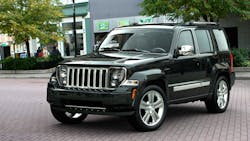Chrysler Agrees to Recall 2.7 Million Jeeps
WASHINGTON - Chrysler announced Tuesday that it would bow to the U.S. safety regulator's pressure to recall 2.7 million Jeep Libertys and Jeep Grand Cherokees over a fire risk that caused dozens of deaths.
Two weeks after rejecting the National Highway Traffic Safety Administration's recommendation for a recall, the No. 3 U.S. automaker said the two sides had "resolved their differences" over the issue.
Chrysler said it would "conduct a voluntary campaign with respect to the vehicles in question" that would offer visual inspection and, "if necessary," improve the sport utility vehicles' rear structure to better withstand crashes.
Chrysler nevertheless maintained its stance that the SUVs – 1993 through 2004 Grand Cherokees and 2002 through 2007 Libertys - met safety standards.
"Chrysler Group's analysis of the data confirms that these vehicles are not defective and are among the safest in the peer group," it said in a statement.
"Nonetheless, Chrysler Group recognizes that this matter has raised concerns for its customers and wants to take further steps, in coordination with NHTSA, to provide additional measures to supplement the safety of its vehicles."
In its letter to Chrysler dated June 3, the NHTSA said a year-long investigation came to a "tentative" conclusion that the fuel tank's placement behind the rear axle in the SUVs raises safety risks.
Pattern of Fires
The agency had identified a pattern of fires erupting in the cars after rear-end collisions ruptured the gas tanks. As many as 51 deaths had been reported in such incidents.
But in a rare rejection by an automaker, on June 4 Chrysler, controlled by Fiat (IW 1000/48), declined to recall the SUVs, saying the agency's conclusions were "based on an incomplete analysis of the underlying data."
Chrysler had conceded that "about 21" deaths had occurred in rear-impact collisions that resulted in fires, but said the rest of the deaths may have been tied to other types of accidents.
The NHTSA though persisted, insisting that the cars may have a defect "that presents an unreasonable risk to safety," and suggesting that it would continue to seek the recall.
The details of the recall and the likely costs to the automaker were not immediately clear.
"Chrysler obviously calculated the risks and benefits and concluded that the cost to repair these vehicles isn't as expensive as the potential long-term damage that could come from bad PR," said Michelle Krebs of auto industry specialists Edmunds.com.
"This was probably the right decision by Chrysler. Last year there were 659 recalls issued by NHTSA, and none of them appear to have had a lasting negative impact on any brand."
Copyright Agence France-Presse, 2013
About the Author
Agence France-Presse
Copyright Agence France-Presse, 2002-2025. AFP text, photos, graphics and logos shall not be reproduced, published, broadcast, rewritten for broadcast or publication or redistributed directly or indirectly in any medium. AFP shall not be held liable for any delays, inaccuracies, errors or omissions in any AFP content, or for any actions taken in consequence.
